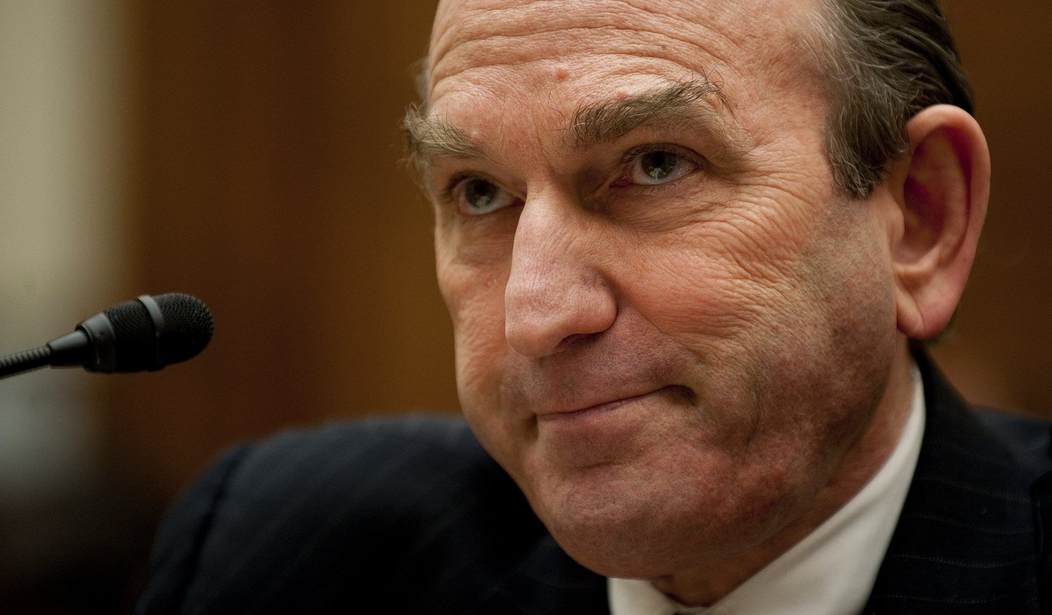Two incompatible views of the world have cohabited under the conservative label since the fall of Communism: a national-interest view that seeks to keep the insoluble problems of failing states at a distance from America, and a Utopian vision of a world remade in America’s image.
American voters puked out the Utopians in the Republican primaries, shunning every candidate who embraced the George W. Bush “Freedom Agenda” in favor of Donald Trump and Ted Cruz — the candidates who refused to carry the Bush administration’s foreign policy baggage. Trump said it best: the Iraq War was one of the dumbest things America ever did in foreign policy, the equivalent of “throwing rocks into a hornet’s nest.”
Grandiose blunders of this kind are not made out by stupidity, though, but by insanity. The American conservative movement was infected by a cult that eroded the common sense of its victims and instilled a messianic, fanatical commitment to nation-building and democracy promotion. What are broadly (and sometimes inaccurately) referred to as the “neo-conservatives” are a cult that succeeded in persuading the unfortunate George W. Bush to spend trillions in treasure and tens of thousands of casualties for the mirage of democracy in Iraq. Such was their influence that an entire generation of Republican foreign policy officials was vetted for cult loyalty.
The Bush administration incubated a generation of ideologues rather than diplomats who created the mess that is now the Middle East. Almost without exception, they backed Hillary Clinton over Donald Trump in the belief that Clinton would pursue Utopian globalism. They bitterly opposed Donald Trump’s national-interest realism.
As a matter of public record, the most fanatical of these ideologues is Elliott Abrams, who ran the Middle East desk at Bush 43’s National Security Council. As Daniel DePetris reports at National Interest, Abrams denounced “Trump and Trumpism” throughout the campaign and declared that he would not vote for his party’s candidate because it was “a question of character and fitness to be Commander-in-Chief.”
The job of American foreign policy, Abrams has argued throughout the past two decades, is to promote democracy. Like the Bourbons in Talleyrand’s bon mot, he has learned nothing and forgotten nothing. As recently as Dec. 13, he wrote the following on the website of the Council on Foreign Relations:
When the Arab Spring began in 2011, supporters of democracy in the Middle East had widespread hopes that the region might turn a corner and move from autocracy to democracy. Those hopes have been realized reasonably well in Tunisia, which has seen free elections and the peaceful alternation of power between political parties. But many other Arab countries have cracked down on dissent and political speech.
The United States should nevertheless support those seeking peaceful change toward more open and democratic political systems. The Arab uprisings of 2011–2012 suggest that the public desire for change is widespread, and democratic political systems provide paths for peaceful change that can accommodate many different social and economic views through compromise.
The Arab uprisings of 2011 produced stateless chaos in Libya and a civil war in Syria that has killed half a million people and displaced more than ten million.
Egypt has regained a certain degree of stability by returning to the military rule that preceded the 2011 events. Yet Abrams remains convinced that he was right all along, and that the United States should continue to pursue the policy that created the mess in the first place.
It is remarkable given this background that Abrams reportedly is under consideration for the number two job at the State Department.
The likely explanation is that Rex Tillerson, the new secretary of State, is looking for a deputy with the diplomatic experience he lacks and has few good choices. The trouble is that the credentialed candidates all have the wrong sort of experience. Former UN Ambassador John Bolton served Bush 43 and supported the Iraq War. There is a difference, to be sure: Bolton learned from the Bush administration’s mistakes and supported Trump. Diplomacy is not a technical skill like drilling for hydrocarbons: it is the pursuit of policy goals that are motivated by a vision of the world, and Abrams’ vision of the world was and remains (as of Dec. 13, 2016) lunatic.
Tillerson needs strong deputies, to be sure. He stumbled at his confirmation hearings by claiming that the United States could deny China access to reefs in the South China Sea to which China already has access as well as the capacity to secure. Evidently he was poorly briefed in an area in which he did not have (and could not be expected to have) expertise.
The Trump administration’s off-the-cuff diplomacy during its first two weeks out of the gate has been sloppy, to be sure. There is a lot to criticize (and I have not hesitated to criticize some of the obvious missteps). Bringing the Bush Utopians back into the picture, though, would be a cure far worse than the disease. During the campaign, Abrams made clear that he would rather see his party fail than see Donald Trump succeed. Inside the administration, Abrams would have the opportunity to make this happen. Arsonists may have great experience with fires, but that doesn’t qualify them to become the captain of the fire brigade.










Join the conversation as a VIP Member